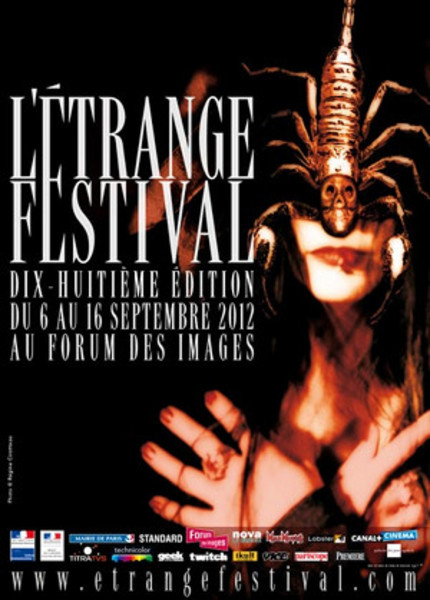L'Etrange Festival 2012: Founder Frédéric Temps on Filling a Cinematic Void (And the Police Visits that Ensue)

The phrase L'Etrange Festival director/creator Frédéric Temps uses most often during our interview is "I don't care." The dismissive refrain is ironic considering the amount of passion and dedication its taken to pioneer and maintain a genre film festival over the last twenty years in a culture so collectively fond of dismissing what they perceive as "low art."
Things he and the festival don't care about include flashy red carpets, cops that show up at their more controversial screenings, prizes awarded by celebrity juries, film programming based on popularity, or for that matter, anything at all besides quality, and even the fact that, now approaching twenty years, it is one of the longest running festivals dedicated to fantastic and genre cinema ("Maybe we are," he says, shrugging. We don't think about that.") And while it clearly gives him a bit a well-deserved pride, he doesn't seem to lose sleep over the fact that he isn't getting paid for his hard work.
"We all work for free, we have for 20 years," Said Temps. "All of the budget from ministry and sponsors etc goes into the production of the festival. Of course, we do work other jobs the rest of the year... But with the festival, we have a mission."
The mission began in 1993 when Temps was working as a film journalist and became fed up with the fact that, despite Paris' reputation as one of the cinema capitals of the world, there was a huge programming void for the genre films as well as bizarre and transgressive cinema.
"DVD didn't exist, so we only had VHS and film festivals. I was always talking to my friends about all these films - Ken Russell, Mario Bava etc. - and every time, we'd realize there was no easy way to see these films in France," Temps said. They were not being released here. We decided, 'Let's create the festival we want to see ourselves.'"
He began without even the money they now receive from ministries and sponsors, but somehow managed to launch a festival that lasted about a month and a half, with two or three different films showing each day.
"We basically talked to distributors whose films were not being shown in France and they were happy to work with us," Temps said. "For example, we showed Schizophrenia for the first time in Paris. It was easy -- The film had never been released in France."
To get an idea of just how extensive and diverse the program has been throughout the years, check out 1Kult's excellent list of every film ever shown at L'Etrange. And yet, in between stories of festivals past, Temp often interjects, "You have no idea how difficult it is do put on a festival like this in Paris,"
To a large extent, he's of course right. I don't. But I do know that upon moving to Paris, I was surprised by the absolute lack of genre films among all of the repertory programming, by the lack of respect many in film production here accord to singular, bizarre talents, even their own Jean Rollin, and by the fact that, despite a few mavericks like Gaspar Noe and Jan Kounen, that Paris, the city which once pushed the limits of cinema, was still spending most of their time and money making mediocre comedy-dramas.
There are exceptions to be sure, but the cultural climate seemed indifferent at best and antagonistic at worst to most cinema fantastique. Frankly, when I first discovered L'Etrange Festival, I was surprised it existed. When I ask about this cultural attitude, Temps lights up.
"I was literally just having this conversation!" Temps said. "I think maybe, maybe we have a cultural problem in France. But, we came from Méliès, Cocteau, Franju! We know this culture, The genre, the surrealism! It makes no sense."
Roots aside though, Temps has come up against his share of resistance and controversy, including police presence at screenings of more extreme films like A Serbian Film and Subconscious Cruelty (screening again at this festival). Even the first year, he arrived to work to find cops waiting for him after somebody called about a short film. "It's ridiculous," muses Temps. "You don't see this happen in America, Spain, Canada, wherever else."
It is perhaps also symptomatic of the filmmaking climate of France, which seems resistant to extreme and genre cinema (besides police movies and an occasional horror movie that slips through the cracks).
"The French guys have an easier time working in other countries than France, Temp said. "Why? I don't know. I don't work in film production. But everybody leaves to shoot their movies. I think maybe you have directors that don't want to shock Mama, to shock people they see every day. It's only my opinion of course, but it's something I have thought about for a long time."
Regardless, the festival is now in it's twentieth year (including a two year hiatus while its venue Forum Des Images remodeled) and going strong, with a slew of guests and a wild program that ranges from Ulrich Seidl to Ben Wheatley, and beyond. As for what lies ahead, Temps adopts the same attitude as he does to most things that don't concern the festival and program itself.
"I don't care what the festival will be tomorrow," said Temps. "We just want to defend these type of films, these young filmmakers who are trying to do something different. We want to put Philippe Garrell and Takashi Miike on the same level."
Check out the L'Etrange Festival website for the full lineup of films and events this year and information about tickets and schedule and stay tuned for reviews and news from the festival.







